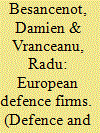|
|
|
Sort Order |
|
|
|
Items / Page
|
|
|
|
|
|
|
| Srl | Item |
| 1 |
ID:
072643


|
|
|
|
|
| Publication |
2006.
|
| Summary/Abstract |
After the fall of the Berlin Wall, European governments adopted a hands-off policy towards the defence industrial base, in an attempt to increase the sector's efficiency and reactivity. In this context, one topical issue is how to motivate defence firms to apply for private rather than public finance. Since banks have no prior experience with European defence firms, a problem of asymmetric information may block this transition. The problem is analysed within the framework of a game between defence firms and banks. It is shown that the Bayesian Equilibrium might correspond to a situation where low-risk firms prefer the state-financed scheme; yet, in a perfect information set-up, the same firms would apply for bank credit. In order to facilitate the transition to private finance, the government might decide to subsidize investors who agree on financing defence firms; the state aid should be made available during a transitory learning period.
|
|
|
|
|
|
|
|
|
|
|
|
|
|
|
|
| 2 |
ID:
138254


|
|
|
|
|
| Summary/Abstract |
This paper presents an analysis of changing rationales and tactics among actors engaged in mobilising private finance for Indonesia's emergent Reducing Emissions from Deforestation and Forest Degradation (REDD+) programme. Despite limited flows of private finance so far, private sector actors have been responsible for a great deal of development and innovation in the forest carbon sector in Indonesia, and have thus played – and continue to play – an important part in shaping the country's REDD+ programme. Drawing on extended field research and interviews with key actors engaged with REDD+ in Indonesia, we identify a variety of private investor motivations, strategies and tactics, many of which depart considerably from the common understanding of REDD+ as avoided deforestation funded through carbon offsets. As non-state actors increasingly shape emerging REDD+ projects, they assume important roles as agents of environmental governance – working through a variety of private market and hybrid modes of forest/climate governance. We describe four general modes of engagement, centred around: investment in REDD+ verified emissions reductions; corporate social responsibility; sustainable commodities; and impact investment. The research thus contributes to an improved understanding of the nature of private REDD+ finance in Indonesia, and the implications, potential and limits of private, market-based climate governance.
|
|
|
|
|
|
|
|
|
|
|
|
|
|
|
|
| 3 |
ID:
177156


|
|
|
|
|
| Summary/Abstract |
This paper analyses the factors explaining the recent boost in solar energy private investments, focusing on the role of public finance and public policy tools - feed-in-tariffs and renewable energy quotas. Drawing on a micro-level database of financial transactions in solar energy projects in 23 OECD countries over the period 2004–2015, we perform a panel data analysis to study the relationship between public finance and public policies and private investments in solar energy, controlling for composition of the energy industry and market characteristics by country. We find that the provision of public finance is positively associated with private finance flows. Furthermore, we show that public policy stimulates private investments, but the effect of renewable energy quotas on private finance is larger than that of feed-in tariffs. Finally, the availability of fossil fuels constitutes an important barrier to solar energy investments, while the presence of alternative sources of clean energy does not hinder private climate finance.
|
|
|
|
|
|
|
|
|
|
|
|
|
|
|
|
|
|
|
|
|